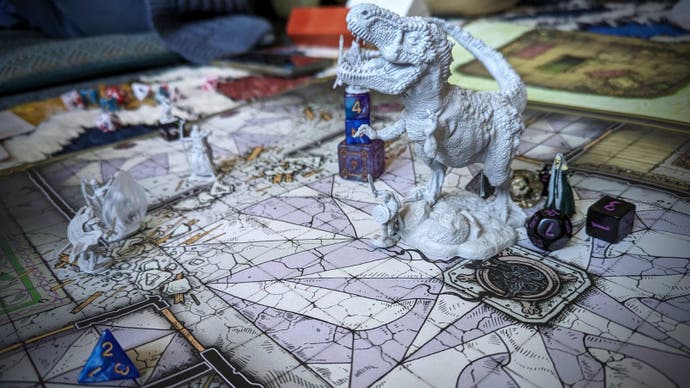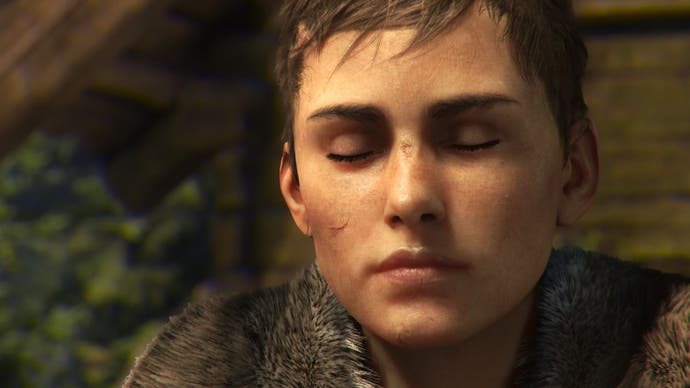How do you end a game?
Fin.
I finished my first Dungeons & Dragons campaign last weekend and I haven't been able to stop thinking about endings since. Game endings in general, I mean - it doesn't need to be restricted to tabletop. It's something I hadn't really considered before, I realised, and now that I am considering it, I realise there's quite a lot going on.
Take our D&D finale as an example. We've been playing The Wild Beyond the Witchlight campaign for months now, ever since the spring, so we've invested a lot of time in our characters and in their adventure - and I suppose in our group relationships too. We've been on a journey. At the weekend, all of that energy we'd invested - which had been building and building over time - was channelled into one climactic point.
It was a suitably grand occasion. We had a huge battle with floor maps and miniatures and, I'm reliably told, our Dungeon Master had no problems killing us if the dice declared it so. For a while, it did look dicey, too. I'm sure I would have died had I not been unexpectedly turned into a T rex; I'm a three-and-a-half foot humanoid hare normally. As it was, though, I bit a bunch of people in half. I was living my best life.
The event, then, didn't lack a sense of occasion. But once it was over and our enemies lay at our feet around us, and the main characters in the story were saying, well done, you've saved the day, that still didn't feel like enough. And I was struck with a powerful sense of directionlessness and purposeless-ness as the campaign came to a rather abrupt end.
What now? All the energy we'd focused into that point suddenly had nowhere to go. But it was still there, it hadn't all dissipated. So although we were still buzzing with triumph, in game terms, there was nothing - after a few conversations - left for us to actually do. There usually was. We'd come to expect there would always be Something More, but now there wasn't. Our DM packed away his incredible assortment of miniatures and props, and prepared for his drive home, and we - in something of a daze - babbled about what might happen next. That was it - The End.

It led to the strangest feeling of inertia. My mind still expected forward momentum because it had become so accustomed to it but now, nope - fffftump! - the shutters had come down and the game was done. And my mind turned to video games for an explanation. They are, after all, the games I am most used to, and I've finished a fair few over the years. How, I wondered, do they do it - how do they deal with endings in games? Is there a consistent method?
I thought of A Plague Tale: Requiem first, for some reason - I think perhaps because it had a powerful effect on me, and because it's relatively recent. That game has a playable epilogue, so once you finish the main story, which ends very emotionally, it transports you a few weeks into the future to see what happens next. I don't think you really need to know what happens next, it's more that you need a bit more time to let what happened settle in.
I had no idea what a denouement was until Donlan started talking about it in relation to this piece, but apparently it's exactly what I'm talking about. A denouement is the part of the story that comes after a climax and in which everything is explained and resolved. It's the real end. Or as I like to think of it, it's the off-ramp for you. Perhaps that's what I need.
Or maybe it isn't about me at all. When I spoke to Asobo about the making of A Plague Tale earlier this year, I was struck by how much more attached the studio was to the characters than me. And it makes total sense - of course they'd be more attached to characters and stories they'd spent much longer with, and created. Perhaps the epilogue was as much for them as it was for me.
We did get an epilogue from our D&D DM, by the way. He wrote his own a day later which was something he didn't need to do, but he did, and he wrote a lot and it was very touching. Tim, you are the best. And it did help me - helped us - wave goodbye. But not entirely.
So are epilogues the answer? Let's think of another game - BioWare games! I've played a lot of those. From what I can remember, they all have epilogues of a sort, although maybe not playable ones. But they usually tell you what happens to the characters you've adventured with, and what your effect on the world has been. Were they not there, I think I would feel the story was incomplete.
The only one that didn't have something like that, at least originally, was Mass Effect 3. I mean, you could argue the entire third game was an ending, and I think I'd probably agree, but originally, when it ended, there was a fairly hard stop. You made your final decision, there was a bit of an outro - I'm sure you know the one I mean - and that was it. Did it satisfy all the invested energy players had poured into a trilogy? I actually didn't mind it. But it was telling that BioWare not only added some 'what happened next' slides to the same outro, but also a playable epilogue in the Citadel DLC after.
Is there another option to an epilogue? This thought actually stumps me for a while because I really struggle to think of examples, which in itself seems to suggest the answer I'm looking for. But I do think of one prominent example: Half-Life 2. At the end of that game, everything just suddenly stops and you don't find out what happens next at all - there's no closure. I wonder if that's maybe why there's always been so much energy propelling the now meme-able whereabouts of Half-Life 3. Then again, is that closer to something like a cliffhanger ending - something designed to keep players wanting more, and not to let them go.
Maybe that's what The Wild Beyond the Witchlight campaign was doing. After all, we needn't stop playing those characters, they're only level eight (of 20). We can take them on other adventures if we like. I bet Wizards of the Coast would like that because there are plenty more D&D campaign books to buy, which aren't cheap. Why, really, would it want to let us go?
I'd hoped to find something while writing this about how to end games, some definitive advice on the matter, some dos and don'ts. But while I did find some talk about tabletop RPGs, Dungeons & Dragons in particular - in one Reddit thread, someone even outright stated, "The most impactful part of a campaign is what happens after the climax." - I didn't find anything unshakably conclusive. There was nothing to suggest you cannot end a story with a bang and let players decide, in their imaginations, what happens next. Maybe that's a good way to keep players thinking about your game.
So while I don't feel as though I'm much further along in understanding how to end a game, I have certainly recognised how hard the task can be, because it varies - it varies so much. How can you know what individual players will want in any particular circumstance? How can you know what the story and characters will mean to them? Perhaps it's simpler as a developer, as Asobo maybe did, to think about what you, the creator, need in order to say goodbye. If you had to end a game, how would you do it?










